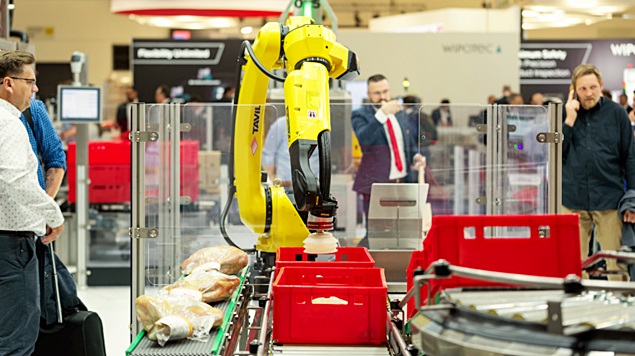1667

The Meat and Protein Processing Industry Faces Major Challenges
The meat and protein processing industry is experiencing significant challenges. Price pressures, a wide range of products, and a persistent shortage of skilled labor necessitate efficient working practices to keep the industry globally competitive.
The Rise of Automation
Increasing automation and innovative technologies, such as artificial intelligence and robotics, present viable solutions to enhance productivity and reduce operating costs. Under the motto "Maximum Performance," the world's leading trade fair for the meat and protein processing industry, IFFA - Technology for Meat and Alternative Proteins, will showcase what is already possible and outline the future course for the industry.
Automation is crucial across many industrial sectors. It not only improves machine and system performance but also helps prevent production interruptions while saving energy and materials. In the food industry, automated control and product traceability have become essential to maintain consistently high quality and meet strict legal requirements.
Automation also serves as an effective tool to combat rising costs and the shortage of skilled labor.
Process automation in the meat and protein industry spans from raw material preparation—such as mixing and grinding—to processing steps like portioning, filling, and molding, as well as thermal processes like cooking and cooling, followed by automated packaging and smart logistics.
However, in many cases, various process stages and production lines are not interconnected, preventing seamless data exchange and optimization of different processes.
Fortunately, there is a solution. Web-based process control systems such as MES and ERP often consist of modular software systems that can be adapted to existing facilities. Thus, the advantages of a fully networked smart factory are not limited to newly built production plants.
Real-Time Data Collection and Analysis
Modern sensors provide precise data on temperature, humidity, weight, and pressure. For instance, temperature and humidity sensors in cold storage facilities help prevent temperature fluctuations, reducing contamination risks.
Weight sensors verify the weight of each meat product, ensuring packaging compliance with specifications. This not only reduces material usage but also minimizes waste and return rates. Another example includes gas composition sensors in packaging, which maintain optimal conditions at all times.
AI Enhances and Accelerates Processing
Like many other industries, artificial intelligence (AI) is transforming the meat and protein sector, elevating it to a new level. AI enables machines to collect, analyze, and derive potential improvements from production data.
In the event of production disruptions, AI can identify cause-and-effect relationships and resolve issues without halting operations or even prevent them in the future. This enhances efficiency while improving safety for both consumers and businesses.
AI-powered image recognition and processing systems are also employed in industrial settings. For instance, AI assists in sorting meat products based on specific criteria such as size, shape, and structure. This not only reduces employee workload but also increases precision.
When used to identify quality attributes like grain or fat content, AI can significantly raise the selling price of individual items. AI-assisted image processing systems are also applied in quality assurance, using historical image data to inspect production in real time and detect irregularities such as color anomalies, foreign objects, or defective packaging.
Predictive Maintenance: A Key Application
AI-assisted systems monitor machine conditions and predict downtime, ensuring maintenance is performed only when necessary. According to a McKinsey study, predictive maintenance in the food industry can reduce maintenance costs by up to 30% and increase plant utilization by 20%.
Machine Learning Elevates Robotics
Industrial robots are already well-established in the food industry, particularly in larger companies. Operating 24/7, they significantly enhance efficiency and productivity.
The distinction between conventional machinery and robotics-integrated technology is often blurred. However, industrial robots are primarily utilized for repetitive tasks commonly found in meat processing, such as cutting, portioning, packaging, sorting, picking, and placing.
AI Takes Robotics to a New Level
Generative AI can leverage machine learning to adapt to new circumstances and situations independently, enabling industrial robots to operate more autonomously and flexibly. A prime example is autonomous mobile robots (AMRs).
Equipped with cameras and sensors, AMRs can evaluate and analyze their surroundings independently. For instance, they can navigate alternative routes when obstacles block planned paths and act autonomously in abnormal situations. As a result, they are ideal assistants in unstructured production environments, warehouses, and logistics centers handling packaging and palletizing.
Despite the multitude of items in distribution centers, AI-assisted industrial robots can accurately select and retrieve the correct products, reject defective or deformed items, and detect packaging formats and weights.
Such robots achieve pick rates of 750 to 1,400 items per hour and can package up to 200 meat products per minute—a significant productivity boost compared to manual processes.
Robots also surpass human workers in precision. For example, they can cut meat faster and more accurately at specific angles while portioning it into the ideal weight and shape. This not only accelerates production but also minimizes raw material waste.
The Future of Meat Processing: AI, Robotics, and Sensor Technology
The meat and protein processing industry is on the brink of a major transformation, driven by AI, robotics, and sensor technology. These advancements not only present opportunities for automating processes and increasing efficiency but also improve product quality and sustainability.
Companies integrating these technologies early will be well-positioned to remain competitive in the global market and tackle the industry's growing challenges.
IFFA - Technology for Meat and Alternative Proteins will showcase the latest technological developments in Frankfurt am Main from May 3 to May 8, 2025. More information is available at: www.iffa.com.





